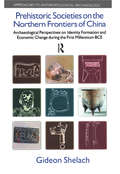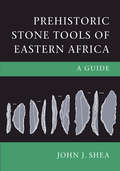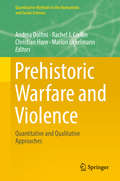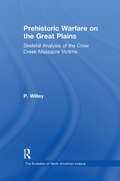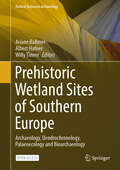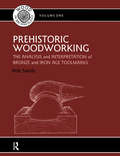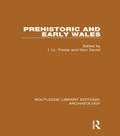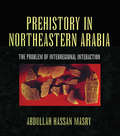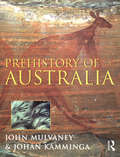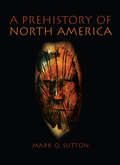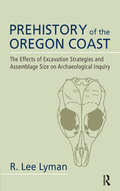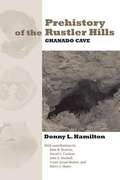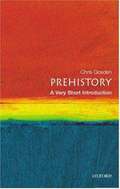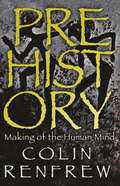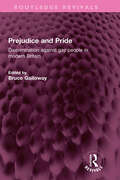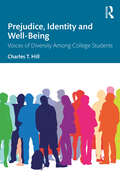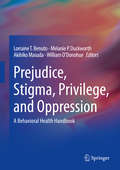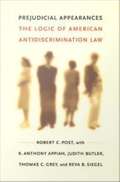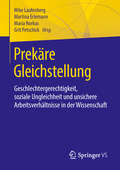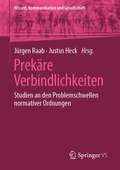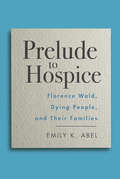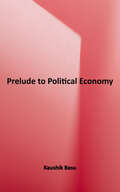- Table View
- List View
Prehistoric Societies on the Northern Frontiers of China: Archaeological Perspectives on Identity Formation and Economic Change During the First Millennium BCE
by Gideon ShelachThe northern borders of China - known as the Northern zone - were a key area of interaction between sedentary and nomadic people during the late second and early first millennium BCE. During this period the region's unique economy, socio-political systems, local cultures and identities took shape. 'Prehistoric Societies on the Northern Frontiers of China' analyses the archaeological record to examine the changes that took place in Northern China in the first millennium. Drawing on field work in the Chifeng area of Inner Mongolia, the book explores dramatic changes in the construction of identities alongside more gradual changes in subsistence strategies and political organization. The book is unique in integrating the archaeological data and historical records of this period with anthropological theory to examine the role of identity construction and the use of symbol in the shaping of East Asian society.
Prehistoric Stone Tools of Eastern Africa: A Guide
by John J. SheaStone tools are the least familiar objects that archaeologists recover from their excavations, and predictably, they struggle to understand them. Eastern Africa alone boasts a 3.4 million-year-long archaeological record but its stone tool evidence still remains disorganized, unsynthesized, and all-but-impenetrable to non-experts, and especially so to students from Eastern African countries. In this book, John J. Shea offers a simple, straightforward, and richly illustrated introduction in how to read stone tools. An experienced stone tool analyst and an expert stoneworker, he synthesizes the Eastern African stone tool evidence for the first time. Shea presents the EAST Typology, a new framework for describing stone tools specifically designed to allow archaeologists to do what they currently cannot: compare stone tool evidence across the full sweep of Eastern African prehistory. He also includes a series of short, fictional, and humorous vignettes set on an Eastern African archaeological excavation, which illustrate the major issues and controversies in research about stone tools.
Prehistoric Textiles: The Development of Cloth in the Neolithic and Bronze Ages with Special Reference to the Aegean
by E. J.W. BarberThis pioneering work revises our notions of the origins and early development of textiles in Europe and the Near East. Using innovative linguistic techniques, along with methods from palaeobiology and other fields, it shows that spinning and pattern weaving began far earlier than has been supposed. Prehistoric Textiles made an unsurpassed leap in the social and cultural understanding of textiles in humankind's early history. Cloth making was an industry that consumed more time and effort, and was more culturally significant to prehistoric cultures, than anyone assumed before the book's publication. The textile industry is in fact older than pottery--and perhaps even older than agriculture and stockbreeding. It probably consumed far more hours of labor per year, in temperate climates, than did pottery and food production put together. And this work was done primarily by women. Up until the Industrial Revolution, and into this century in many peasant societies, women spent every available moment spinning, weaving, and sewing. The author, Elizabeth Wayland Barber, demonstrates command of an almost unbelievably disparate array of disciplines--from historical linguistics to archaeology and paleobiology, from art history to the practical art of weaving. Her passionate interest in the subject matter leaps out on every page. Barber, a professor of linguistics and archaeology, developed expert sewing and weaving skills as a small girl under her mother's tutelage. One could say she had been born and raised to write this book. Because modern textiles are almost entirely made by machines, we have difficulty appreciating how time-consuming and important the premodern textile industry was. This book opens our eyes to this crucial area of prehistoric human culture.
Prehistoric Warfare and Violence: Quantitative and Qualitative Approaches (Quantitative Methods in the Humanities and Social Sciences)
by Christian Horn Andrea Dolfini Rachel J. Crellin Marion UckelmannThis is the first book to explore prehistoric warfare and violence by integrating qualitative research methods with quantitative, scientific techniques of analysis such as paleopathology, morphometry, wear analysis, and experimental archaeology. It investigates early warfare and violence from the standpoint of four broad interdisciplinary themes: skeletal markers of violence and weapon training; conflict in prehistoric rock-art; the material culture of conflict; and intergroup violence in archaeological discourse. The book has a wide-ranging chronological and geographic scope, from early Neolithic to late Iron Age and from Western Europe to East Asia. It includes world-renowned sites and artefact collections such as the Tollense Valley Bronze Age battlefield (Germany), the UNESCO World Heritage Site at Tanum (Sweden), and the British Museum collection of bronze weaponry from the late Shang period (China). Original case studies are presented in each section by a diverse international authorship.The study of warfare and violence in prehistoric and pre-literate societies has been at the forefront of archaeological debate since the publication of Keeley’s provocative monograph ‘War Before Civilization’ (Oxford 1996). The problem has been approached from a number of standpoints including anthropological and behavioural studies of interpersonal violence, osteological examinations of sharp lesions and blunt-force traumas, wear analysis of ancient weaponry, and field experiments with replica weapons and armour. This research, however, is often confined within the boundaries of the various disciplines and specialist fields. In particular, a gap can often be detected between the research approaches grounded in the humanities and social sciences and those based on the archaeological sciences. The consequence is that, to this day, the subject is dominated by a number of undemonstrated assumptions regarding the nature of warfare, combat, and violence in non-literate societies. Moreover, important methodological questions remain unanswered: can we securely distinguish between violence-related and accidental trauma on skeletal remains? To what extent can wear analysis shed light on long-forgotten fighting styles? Can we design meaningful combat tests based on historic martial arts? And can the study of rock-art unlock the social realities of prehistoric warfare? By breaking the mould of entrenched subject boundaries, this edited volume promotes interdisciplinary debate in the study of prehistoric warfare and violence by presenting a number of innovative approaches that integrate qualitative and quantitative methods of research and analysis.
Prehistoric Warfare on the Great Plains: Skeletal Analysis of the Crow Creek Massacre Victims (Evolution of North American Indians Series)
by P. WilleyFirst Published in 1991.This study is the product of the discovery, excavation, processing, data collection and analysis of nearly 500 human skeletons from the Crow Creek Massacre Project, South Dakota. In about 1325 AD nearly 500 American Indians were massacred, and their remains were discovered, excavated and cleaned in 1978. The general purpose of the Crow Creek osteological study were to describe the remains as fully as time permitted and compare these results with other samples. This volume presents information concerning the Crow Creek bone elements, paleodemography, cranial affiliations, mutilations and stature. It emphasizes the unique feature of the sample and compares the Crow Creek sample with other skeletal samples from the Plains.
Prehistoric Wetland Sites of Southern Europe: Archaeology, Dendrochronology, Palaeoecology and Bioarchaeology (Natural Science in Archaeology)
by Ariane Ballmer Albert Hafner Willy TinnerThis is an open access book. Unique in its scope, this book provides for the first time a Southern European perspective on prehistoric wetland settlements and their natural environment. These are dwellings originally built in humid locations, i.e. on shores and in shallow water areas of lakes, bogs, marshes, rivers, estuaries and lagoons. The relevant archaeological remains are in most cases waterlogged and offer outstanding preservation conditions for organic materials and are moreover in close proximity to uninterrupted natural archives (e.g. lake or mire sediments), which allows for a broad range of transdisciplinary research approaches. The sites discussed in this book date from the Neolithic and the Bronze Age (c. 5500–1000 BC), and are located in nine countries of Southern Europe, i.e. Spain, France, Italy, Slovenia, Croatia, North Macedonia, Albania, Greece and Bulgaria. Four dimensions of prehistoric wetland settlements are explored in the book – the archaeological, the dendroarchaeological, the palaeoecological and the bioarchaeological: Part I is dedicated to archaeology, i.e. the excavation of settlement remains, their transdisciplinary exploration as well as their interpretation; Part II deals with dendroarchaeology and its contribution to the understanding of occupation sequences and regional chronologies; and Part III concerns uninterrupted off-site palaeoecological records of past ecosystem change, including human–environment interactions, as well as bioarchaeological on-site approaches to subsistence strategies and land use practices. Prehistoric Wetland sites of Southern Europe showcases how different disciplines and areas of expertise from the humanities and the natural sciences meet on an equal footing to elaborate coherent pictures of the past. Besides a cross-section of research statuses of different archaeological sites, currently ongoing research as well as novel, hitherto unpublished case studies and findings are made accessible to the international research community. Drawing on a wide range of expert contributions from both archaeology and the natural sciences, this book targets scholars, professionals, and students from the fields of prehistoric archaeology and palaeo-sciences, and is furthermore of interest to cultural-heritage stakeholders.
Prehistoric Woodworking: The Analysis and Interpretation of Bronze and Iron Age Toolmakers (UCL Institute of Archaeology Publications)
by Rob SandsRob Sands explores the evidence left by the use of axes on wooden beams and tools found in waterlogged archaeological sites dating over 2000 years old. A toolmark can not only inform the archaeologist about the implement used, but also provides evidence of building and artifact construction methods and labor patterns. Examples come from the author’s work at Oakbank Crannog in Scotland. The volume examines the methods of recording, techniques of analysis and implications of this unusual form of evidence.
Prehistoric and Early Wales (Routledge Library Editions: Archaeology)
by I. Ll. Foster Glyn DanielThis volume is based on lectures given when the British Summer School of Archaeology was held at Bangor in August 1959. It is a summary account of current knowledge then about ancient Wales written for archaeologists, historians and others, covering the Old Stone Age, Neolithic Wales, the Bronze Age, Early Iron Age, Roman Wales and Wales in the fifth to seventh centuries A.D.
Prehistory in Northeastern Arabia
by Abdullah Hassan MasryThis manuscript in its original thesis form was published by Field Research Projects of Florida in 1974. It had a very limited circulation and was basically in the form of a mimeographed edition. The version now published here represents the work for the first time as a proper publication in book form and has been revised and edited and is appropriately produced as a regular archaeological book. Fundamentally this was and remains the seminal work on the subject and was the first in its filed. It is an integral work of scholarship of permanent value. It is a work written in its own time and no attempt has been made to retrospectively interfere or change the nature of the text or its conclusions but to publish it for what it is. The work has ushered in a series of field excavations and analyses that expand upon it and amplify the information already given in the work itself. Thus one could say that this original work has had a seminal and indeed catalytic impact on the archaeology of the Gulf over the last two decades.This edition first published in 1997. Routledge is an imprint of Taylor & Francis, an informa company.
Prehistory of Australia
by Johan KammingaAustralia's human prehistory through more than 40,000 years is the challenging theme of this masterly survey. John Mulvaney and Johan Kamminga bring together the discoveries and often controversial interpretations of six decades of archaeological research to reveal that across this island continent, in the face of contrasting environments and changing climates, human responses produced many cultures, languages and life styles. The Old World is usually credited with the origins of art and spirituality. Recent discoveries, however, prove that symbolic rock art and complex burial rites also existed in Australia at challengingly early times. The authors evaluate the dating evidence upon which Australia's human story before 1788 is reconstructed. They review diverse topics, such as the controversy about the time people first arrived on the continent's northern coast, the extinction of marsupial megafauna and the diversity of Aboriginal rock art. Prehistory of Australia explains why Aboriginal Australia is recognised today for its significance in global prehistory and why so many of its archaeological places have merited World Heritage listing.
Prehistory of North America
by Mark SuttonA Prehistory of North America covers the ever-evolving understanding of the prehistory of North America, from its initial colonization, through the development of complex societies, and up to contact with Europeans.This book is the most up-to-date treatment of the prehistory of North America. In addition, it is organized by culture area in order to serve as a companion volume to “An Introduction to Native North America.” It also includes an extensive bibliography to facilitate research by both students and professionals.
Prehistory of the Oregon Coast: The Effects of Excavation Strategies and Assemblage Size on Archaeological Inquiry (New World Archaeological Record Ser.)
by R Lee LymanThis book is the first synthesis of the prehistory of the coast of Oregon. It analyzes the artifacts and mammalian faunal remains of three representative sites on the coast. A model of the evolution of cultural adaptational strategies is presented and tested, from which it creates a model of coastal cultural development. On a methodological level, the volume examines the overriding importance and effects of various sampling techniques.
Prehistory of the Rustler Hills: Granado Cave
by Donny L. HamiltonThe Northeastern Trans-Pecos region of Texas is an unforgiving environment for anyone living off the land, yet nomadic hunters and gatherers roamed its deserts and mountains and sheltered in caves and sinkholes from around AD 200 to 1450. This book provides detailed insights into the lifeways of these little-known prehistoric peoples. It places their occupation of the region in a wider temporal and cultural framework through a comprehensive description and analysis of the archaeological remains excavated by Donny L. Hamilton at Granado Cave in 1978. Hamilton begins with a brief overview of the geology and environment of the Granado Cave area and reviews previous archaeological investigations. Then he and other researchers present detailed analyses of the burials and other material remains found in the cave, as well as the results of radiocarbon dating. From these findings, he reconstructs the subsistence patterns and burial practices of these Native Americans, whom he identifies as a distinct group that was pushed into the environment by surrounding peoples. He proposes that they should be represented by a new archaeological phase, thus helping to clarify the poorly understood late prehistory of the Trans-Pecos. Donny L. Hamilton is Associate Head of the Department of Anthropology at Texas A & M University.
Prehistory: A Very Short Introduction
by Chris GosdenMany of the familiar aspects of modern life are no more than a century or two old, yet our deep social structures and skills were in large measure developed by small bands of our prehistoric ancestors many millennia ago. In this book, readers are invited to think seriously about who we are by considering who we have been.
Prehistory: The Making Of The Human Mind (Mcdonald Institute Monographs)
by Professor Lord Colin RenfrewA brief and original prehistory of the worldPrehistory covers human existence before written records, i.e. most of human existence. But it also refers to the discipline through which we scrutinize prehistoric times. PREHISTORY begins by looking at the discovery of a remote human past and the subsequent dramatic growth of the study of prehistory: early archaeology; geology; Darwin's ideas of evolution; cave paintings; fossil discoveries of human ancestors; museums and collections; radiocarbon dating and DNA analysis.Renfrew challenges the conventional assumption of an all-important 'human revolution' 40,000 years ago - when Homo Sapiens first appeared in Europe - and suggests that the key developments were much later. The author's case-studies range widely, from Orkney to the Balkans, from the Indus Valley to Peru, from Ireland to China, and provide fresh insights on landmark monuments such as the Egyptian pyramids, the Valley of the Kings, Stonehenge and the sacrificial burial pyramids at Teotihuacan in Mexico. The book closes with a fascinating chapter on the transition from Prehistory to History, on early writing systems.
Prejudice and Pride
by Damien-Claude BelangerAs a country with enormous economic, military, and cultural power, the United States can seem an overwhelming neighbour - one that demands consideration by politicians, thinkers, and cultural figures. Prejudice and Pride examines and compares how English and French Canadian intellectuals viewed American society from 1891 to 1945. Based on over five hundred texts drawn largely from the era's periodical literature, the study reveals that English and French Canadian intellectuals shared common preoccupations with the United States, though the English tended to emphasize political issues and the French cultural issues. Damien-Claude Belanger's in-depth analysis of anti-American sentiment during this era divides Canadian thinkers less along language lines and more according to their political stance as right-wing, left-wing, or centrist. Significantly, the era's discourse regarding American life and the Canadian-American relationship was less an expression of nationalism or a reaction to US policy than it was about the expression of wider attitudes concerning modernity.
Prejudice and Pride: Discrimination against gay people in modern Britain (Routledge Revivals)
by Bruce GallowayFirst published in 1983, Prejudice and Pride chronicles legal and social discrimination against gay people living in Britain in 1980s. The book alerts its readers to the ways in which gay men and women were treated in our society and how discrimination in each area can be tackled. The book speaks to us all, providing a blueprint for action through the 1980s. While things today might be better, the book is a reminder that the struggle for equal rights was and will continue to be long and cumbersome. The book acknowledges the action and support of the Campaign for Homosexual Equality and will be of interest to students of history, sociology, law, gender studies and sexuality studies.
Prejudice, Identity and Well-Being: Voices of Diversity Among College Students
by Charles T. HillThis essential and timely text looks at the ways in which various identities are socially constructed by students, exploring and comparing multiple dimensions of diverse identities, and the various ways students try to fit in when faced with prejudice and discrimination. Based on more than 20 years of data collected from Multiple Identities Questionnaires, plus Self-Identity papers in the author’s Diverse Identities course, this book gives voice to the diverse and intersectional identities experienced by students at a formative time in their lives. Analyzing data from more than three thousand college students, the book gives a uniquely comprehensive overview of identity formation, stigma, prejudice, and discrimination, which are part of conflict around the world. Author Charles T. Hill asks to what extent the students have experienced prejudice or discrimination regarding each of their identities, their own prejudice and discrimination toward others of each identity, and the importance of each type of identity for their self-concept. Split into three sections: the first part of the book gives an overview of terminologies and theoretical concepts, the second part explores the multiple dimensions of each identity using data from the MIQ interspersed with quotes from Self-Identity papers, and the third part compares and combines the different types of identities. Introduced with a foreword by Professor Emeritus of Africana Studies James M. Jones, the book opens a space to help students and others explore their identities, realize that they are not alone in their struggles with prejudice, and accept themselves with pride in their identities. Featuring highlighted key concepts and self-reflection sections, as well as further reading, measures, and statistical results, this book is essential not only for undergraduate and graduate students in social psychology, health psychology, sociology, ethnic studies, and social work, but also for therapists, parents, teachers and practitioners running Diversity Training Programs for non-students.
Prejudice, Stigma, Privilege, and Oppression: A Behavioral Health Handbook
by Lorraine T. Benuto Akihiko Masuda Melanie P. Duckworth William O’DonohueThis book addresses the ways in which clinical psychologists ought to conceptualize and respond to the prejudice and oppression that their clients experience. Thus, the link between prejudice and oppression to psychopathology is explored. Basic scientific information about prejudice is reviewed, and the current status of the major minority groups is explored. Chapters examine the role of prejudice and oppression in institutional structures such as the Diagnostic and Statistical Manual of Mental Disorders and professional organizations. The discussion addresses ways to assess these phenomena in individual cases and how to intervene in psychotherapy. The book ventures to evaluate the status of the profession of psychology with respect to prejudice, stigmatization, and oppression by critically examining evidence that the profession has responded adequately to these social problems. These issues are hard to talk about and are not well talked about in the field. This book is a push in the right direction.
Prejudicial Appearances: The Logic of American Antidiscrimination Law
by Robert C. Post Judith Butler Reva B. Siegel K. Anthony Appiah Thomas C. GreyIn Prejudicial Appearances noted legal scholar Robert C. Post argues modern American antidiscrimination law should not be conceived as protecting the transcendental dignity of individual persons but instead as transforming social practices that define and sustain potentially oppressive categories like race or gender. Arguing that the prevailing logic of American antidiscrimination law is misleading, Post lobbies for deploying sociological understandings to reevaluate the antidiscrimination project in ways that would render the law more effective and just. Four distinguished commentators respond to Post's provocative essay. Each adopts a distinctive perspective. K. Anthony Appiah investigates the philosophical logic of stereotyping and of equality. Questioning whether the law ought to endorse any social practices that define persons, Judith Butler explores the tension between sociological and postmodern approaches to antidiscrimination law. Thomas C. Grey examines whether Post's proposal can be reconciled with the values of the rule of law. And Reva B. Siegel applies critical race theory to query whether antidiscrimination law's reshaping of race and gender should best be understood in terms of practices of subordination and stratification. By illuminating the consequential rhetorical maneuvers at the heart of contemporary U. S. antidiscrimination law, Prejudical Appearances forces readers to reappraise the relationship between courts of law and social behavior. As such, it will enrich scholars interested in the relationships between law, rhetoric, postmodernism, race, and gender.
Prekäre Gleichstellung
by Mike Laufenberg Martina Erlemann Maria Norkus Grit PetschickDer vorliegende Band nimmt Wechselbeziehungen zwischen Gleichstellungspolitiken, strukturellen Diskriminierungsformen und prekären Arbeitsverhältnissen in der neoliberalen Hochschule in den Blick.Die Arbeits- und Lebenssituation von Wissenschaftler_innen hat sich in den vergangenen zwei Jahrzehnten tief greifend verändert. Die fortschreitende Ökonomisierung von Hochschulen und anderen Wissenschaftsorganisationen hat zu einer Zuspitzung von Wettbewerb und Konkurrenz geführt, die sich auch auf die Arbeits- und Wissenschaftskultur auswirkt. Insbesondere der akademische Mittelbau ist von einer verschärften Prekarisierung wissenschaftlicher Arbeitsverhältnisse und Laufbahnen betroffen. Zeitgleich lässt sich eine verstärkte Institutionalisierung von Gleichstellungs- und Diversitypolitiken in der Wissenschaft beobachten. Doch während an den hiesigen Universitäten heute mehr Frauen als je zuvor studieren, promovieren und wissenschaftliche Laufbahnen einschlagen, wirken strukturelle gruppenbezogene Benachteiligungen und Diskriminierungsformen fort. Die Ökonomisierung und Prekarisierung wissenschaftlicher Arbeit sowie die Thematisierung von Geschlechterungleichheit, institutionellem Rassismus und sozialer Selektivität in der Wissenschaft haben in den vergangenen Jahren als Einzelphänomene Aufmerksamkeit erfahren, wurden bislang jedoch nur selten systematisch in Bezug zueinander untersucht.Die Herausgeber_innenDr. Mike Laufenberg ist wissenschaftlicher Mitarbeiter am Zentrum für interdisziplinäre Frauen- und Geschlechterforschung an der Technischen Universität Berlin.Dr. Martina Erlemann ist Maria-Göppert-Mayer-Gastprofessorin für Technik & Gender an der Hochschule Emden/Leer.Maria Norkus ist wissenschaftliche Mitarbeiterin am Institut für Soziologie der Technischen Universität Berlin.Grit Petschick ist wissenschaftliche Mitarbeiterin am Institut für Chemie der Technischen Universität Berlin.
Prekäre Intimität: Eine Ethnografie der Körperarbeit in Nagel- und Kosmetikstudios (Geschlecht und Gesellschaft #78)
by Isabel KleinDas Buch entwickelt einen affekttheoretisch informierten Begriff prekärer Intimität auf Grundlage ethnografischer Feldforschung. Intimität und intime Arbeit führen zu einer spezifischen Form der Prekarisierung, deren Konzeptualisierung auch über das untersuchte Feld hinausreicht und wichtige Impulse für die Erforschung des Wandels der Arbeits- und Geschlechterverhältnisse liefert. Mit Hinblick auf das Forschungsdesiderat sogenannter einfacher feminisierter Dienstleistungen zeigt die Autorin, dass Arbeit, die sich mit dem Lebendigen befasst, weit mehr als Care-Arbeiten umfasst; Begriffe wie „einfache” Dienstleistungen reproduzieren diesen Ausschluss und verkennen die Komplexität der verrichteten Arbeit an anderen Körpern.
Prekäre Verbindlichkeiten: Studien an den Problemschwellen normativer Ordnungen (Wissen, Kommunikation und Gesellschaft)
by Jürgen Raab Justus HeckVertrauensverluste und Glaubwürdigkeitskrisen von gesellschaftlichen Institutionen sind Ausdruck der Pluralisierung von Werten und Normen und der zunehmenden Verhandelbarkeit, Labilität und Ungewissheit für allgemein und beständig genommener Verbindlichkeiten. Die im Band versammelten Studien zu Sprechweisen, Freiheitsdiskussionen, Rechtsfindungen und Polizeiarbeiten geben solch prekäre Verbindlichkeiten als Problemschwellen normativer Ordnungen zu erkennen. Ihre Komplexität fordert die Geistes-, Kultur und Sozialwissenschaften heraus, tradierte Verständnisse, Begriffe und Methoden zu prüfen, zu aktualisieren, zu erweitern und zu verfeinern. Diese Sondierungs- und Präzisierungsarbeiten sind nur interdisziplinär zu leisten. Hierfür stellt das hier unterbreitete Forschungskonzept der prekären Verbindlichkeiten ein vielversprechendes Potential in Aussicht.
Prelude to Hospice: Florence Wald, Dying People, and their Families (Critical Issues in Health and Medicine)
by Emily K. AbelHospices have played a critical role in transforming ideas about death and dying. Viewing death as a natural event, hospices seek to enable people approaching mortality to live as fully and painlessly as possible. Award-winning medical historian Emily K. Abel provides insight into several important issues surrounding the growth of hospice care. Using a unique set of records, Prelude to Hospice expands our understanding of the history of U.S. hospices. Compiled largely by Florence Wald, the founder of the first U.S. hospice, the records provide a detailed account of her experiences studying and caring for dying people and their families in the late 1960s and early 1970s. Although Wald never published a report of her findings, she often presented her material informally. Like many others seeking to found new institutions, she believed she could garner support only by demonstrating that her facility would be superior in every respect to what currently existed. As a result, she generated inflated expectations about what a hospice could accomplish. Wald’s records enable us to glimpse the complexities of the work of tending to dying people.
Prelude to Political Economy: A Study of the Social and Political Foundations of Economics
by Kaushik BasuMainstream economics was founded on many strong assumptions. Institutions and politics were treated as irrelevant, government as exogenous, and social norms as epiphenomena. As an initial gambit this was fine. But as the horizons of economic inquiry have broadened, these assumptions have become hindrances rather than aids. If we want to understand why some economies succeed and some fail, why some governments are effective and others not, why some communities prosper while others stagnate, it is essential to view economics as embedded in politics and society. <p><p>Prelude to Political Economy is a study of this embeddedness; it argues for an 'inclusive' approach to institutions and the state. Modern economics recognizes that individuals' pursuit of their own selfish ends can result in socially suboptimal outcomes -- the Prisoner's Dilemma being the stark example. It has been suggested that what we need in such an eventuality is 'third-party' intervention, which can take the form of imposing punishment on players. Kaushik Basu objects to this method of wishing third parties out of thin air. He argues that if a third party that could impose its will on others were available, then it should have been modeled as a player to start with. <p><p>The adoption of such an inclusive approach has implications for our conception of the state and the law. It means that the law cannot be construed as a factor that changes the game that citizens play. It is instead simply a set of beliefs of citizens; and, as such, it is similar to social norms. What the law does for an economy, so can social norms. The book discusses how the nature of policy advice and our conception of state power are affected by this altered view of the state and the law. As corollaries, the book addresses a variety of important social and philosophical questions, such as whether the state should guarantee freedom of speech, whether determinism is compatible with free will, and whether the free market can lead to coercion.
